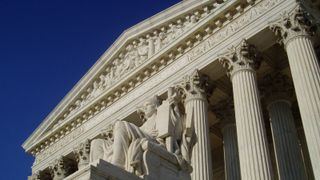Supremes Mull 'Other' FCC Net Neutrality Rule Appeal

The Supreme Court could soon make a decision on that other net neutrality rule challenge, perhaps as soon as next Monday (Nov. 5).
The High Court has yet to decide on whether to hear the appeal by broadband providers and the government of the 2015 Open Internet order adopted under a Democratic FCC headed by Tom Wheeler. That appeal was essentially mooted by the decision of the Republican FCC under current Republican chairman Ajit Pai to reverse the Open Internet order's classification of internet access as a Title II service and imposition of rules against blocking, throttling, paid prioritization, and future efforts the FCC concluded would hurt an open internet. That was just what the ISPs wanted.
Pai's deregulatory move has been challenged by Mozilla and others in the U.S. Court of Appeal for the D.C. Circuit, but the Supreme Court considered the ISP appeal request and requests by the Trump Administration and ISPs to vacate the 2015 order at its Friday (Oct. 26) conference, according to communications attorney Andrew Schwartzman. Following that conference, at which the Justices decide whether or not to hear appeals, theoretically the court could have weighed in as early as Monday (Oct. 29), but it often holds off cases to a subsequent conference, said Schwartzman.
The court will likely deny cert (refuse to hear the appeal), he said, but could also vacate the previous order at the same time—he says that one is harder to call—so net neutrality decision watchers will have their eye on those Monday announcements.
If the 2015 order is vacated, that means that those challenging the Restoring Internet Freedom order—Schwartzman is on that side—would not be able to use the previous D.C. court decision upholding that order as precedent. Instead the D.C. circuit would have to review the Pai order "de novo," or essentially from a clean slate.
If the 2015 rules were vacated, and the D.C. Circuit sided with Mozilla et al. and invalidated the FCC's order, it isn't clear just which net neutrality rules would apply, though it would depend on what the court said in invalidating the Pai order. "Nobody has figured out what happens if the Wheeler rules are vacated and the Pai rules are reversed," said Schwartzman. It depends on whether they are vacated in part or reversed and remanded. "It is far too complicated to figure out at this point."
Also complicating the issue is the fact that Supreme Court Justice Brett Kavanaugh came from the D.C. circuit, where he dissented from that court's decision not to hear ISPs challenge to the Wheeler rules, so he may recuse himself from the decision on whether to grant cert or vacate. Cert looks like a long shot anyway, but it would take five votes to vacate the order and if Kavanaugh recuses himself, there might not be enough votes to vacate. But Schwartzman also points out that federal judges are not required to recuse themselves according to any standard, so he could well decide to stay in the case.
Multichannel Newsletter
The smarter way to stay on top of the multichannel video marketplace. Sign up below.
There is actually a third net neutrality court case, DOJ's and ISPs challenge to the California law reviving the net neutrality rules. But those parties and California have agreed to hold the suit in abeyance until the D.C. Circuit rules on the Pai order, and perhaps even longer if that decision is ultimately appealed to the Supremes as well.
Contributing editor John Eggerton has been an editor and/or writer on media regulation, legislation and policy for over four decades, including covering the FCC, FTC, Congress, the major media trade associations, and the federal courts. In addition to Multichannel News and Broadcasting + Cable, his work has appeared in Radio World, TV Technology, TV Fax, This Week in Consumer Electronics, Variety and the Encyclopedia Britannica.

